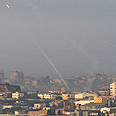
In search of moral clarity
NGOs must distinguish between desire to kill innocents, obligation to protect citizens
Israel finds itself facing familiar threats as the current operation in Gaza continues to unfold. On the military front, there are echoes of the Second Lebanon War, as Israel responds to a highly motivated enemy, a proxy of Iran which has consistently targeted Israeli civilians.
The shadows of 2006 and beyond also litter the battle for public and world opinion. Once again, the media, international bodies such as the United Nations and influential non-governmental organizations (NGOs) threaten to cast Israel in a negative light.
Israel would appear to have learnt much since 2006 – Pinpoint strikes have minimized civilian casualties so far while Israel’s public relations effort has communicated a unified and clearer message. Yet, the threat posed by NGOs continues unchecked. This follows a worrying track record in previous campaigns.
During the Second Lebanon War, human rights groups, in particular Human Rights Watch (HRW) and Amnesty International rushed to issue almost daily condemnations of “disproportionate force” and “war crimes.”
In one particular case, at Qana, HRW claimed massive casualties from one air attack, without having the courtesy to research the facts. The subsequent damaging headlines for Israel prompted Prime Minister Ehud Olmert to call a 48 hour truce. This presented Hizbullah the opportunity to re-group, further prolonging the war.
HRW’s subsequent correction went almost unnoticed, the damage already done. Meanwhile, back in 2002, at the height of operation Defensive Shield, false Palestinian claims of a “massacre” in Jenin were fuelled by Amnesty International and as a result grisly headlines were flashed across the globe.
NGO statements since the start of Israel’s Gaza operation have been full of familiar and worrying rhetoric. Predictably, groups such as Amnesty International and Oxfam were quick to label Israel’s targeted strikes as “disproportionate” and “indiscriminate.” Despite the legal explanations from international experts that proportionality is unconnected to a simple body count, with the help of Hamas officials and the world’s media, these terms have become household phrases.
Manipulation of legal terminology perhaps reached a peak days after the Israeli air strikes began, when European Union funded NGO Physicians for Human Rights-Israel repeated the untenable allegation that Israel still occupies Gaza.
Ironically, the only remaining Israeli in Gaza before the operation was a kidnapped soldier, Gilad Shalit, who has been held captive by Hamas for over two and a half years and whose fate has gone almost unnoticed by the majority of human rights groups.
Dangerous moral equivalence
These declarations are merely a continuation of a long-standing NGO campaign over Gaza. Israel’s initial response to daily rocket barrages was a partial blockade of Gaza. Although fighting Qassams with non-violent obstruction could be regarded as “disproportionate” in the extreme, for almost a year NGOs have shamefully labeled Israel’s less than aggressive policy “collective punishment” tantamount to a “war crime.”
The response of the NGO community to the current Gaza operation has also been characterized by the dangerous moral equivalence created between the actions of Hamas and the IDF. While Hamas measures success in terms of Israeli civilians killed, Israel has made careful use of intelligence and weapons to avoid civilian casualties.
Yet, groups such as Israeli NGO B’tselem erase this context by insisting that “all parties” must “prevent the harming of civilians.” The illusion is created that both sides are equally bloodthirsty, equally guilty.
In some respects, this is similar to the demand by various world leaders that “all violence” must end. Leading politicians and statesmen may feel the need to project evenhandedness in an effort to preserve their own diplomatic positions, but the same restrictions cannot apply to NGOs.
Human rights NGOs, by their very nature, are called upon to distance themselves from political considerations and provide moral clarity. In the case of the Gaza operation, they are failing to do so.
Israel’s leaders have been careful to make clear that the operation may last some time. Difficult decisions will need to be made along the way by all parties involved, including the human rights community. Should they fail to take a clear moral stance, to distinguish between the desire to kill innocents and the obligation to protect citizens, they will have betrayed the very moral principles that they seek to defend.
Dan Kosky is Communications Director of NGO Monitor, www.ngo-monitor.org










